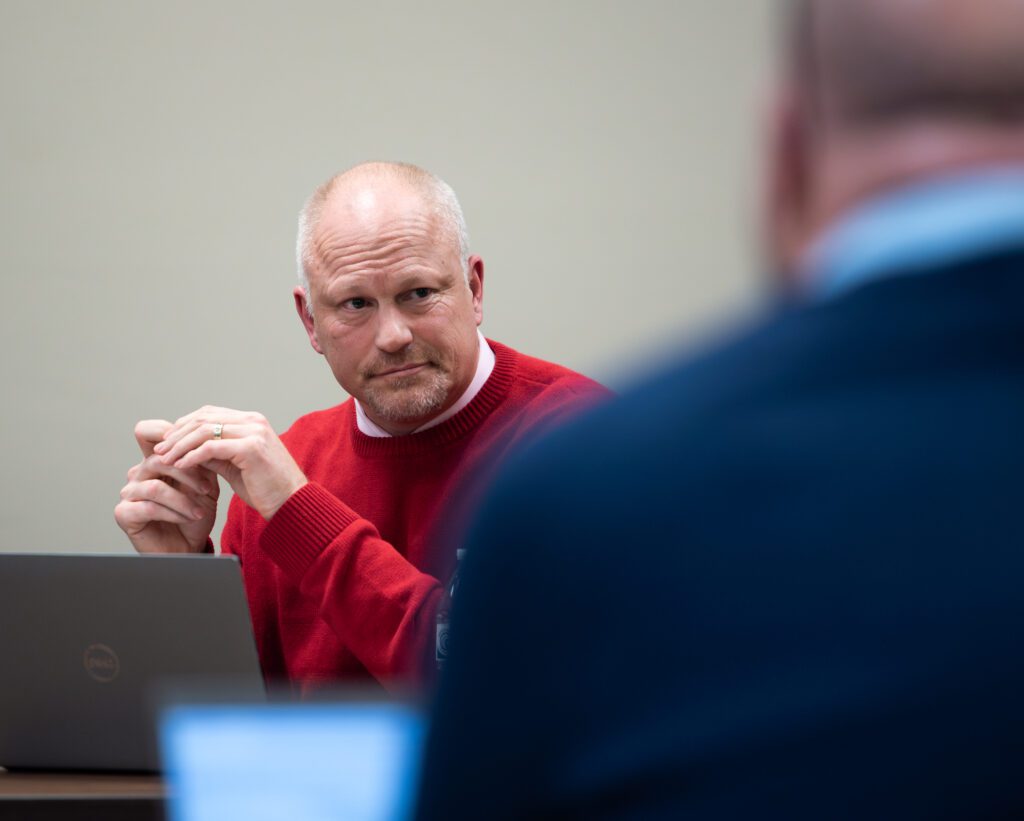Most school districts in Whatcom and Skagit counties have failed to follow, or don’t know if they have followed, their rules for reviewing sexual harassment policies, according to an analysis by Cascadia Daily News.
At least two, Bellingham and Burlington-Edison, have not convened a designated group of stakeholders to assess policy by the end of 2023, even after documented sexual harassment complaints.
An ad hoc committee functions as a proverbial “canary in the coal mine” in a bureaucratic landscape shrouded by confidentiality, said Skagit County parent Danica Kilander, who is taking the lead as a community organizer fighting for increased transparency and protection of children in the Burlington Edison School District.
As of 2023, 11 of the 14 districts in Whatcom and Skagit counties required an ad hoc committee of staff, students, parents and volunteers to review the effectiveness of the district’s policy on the sexual harassment of students.
Nine districts require an annual meeting. Of those, only four confirmed they had done so, with most holding their first meeting within the last 12 months, after years of dormancy or non-compliance with the policy, according to a CDN survey of district documents.
The absence of this type of policy review could leave students vulnerable to any potential shortcomings in the system, experts say.
Bellingham Public Schools is the only district that has an “as needed” policy for gathering stakeholders to review the effectiveness of their sexual assault procedures. The district confirmed in February that it has not held a meeting because it has not identified any need to do so. This is despite three district administrators who faced charges for failing to report a sexual assault of a student. The three assistant principals resolved criminal charges in December 2023 through an agreed resolution, but a federal case is still pending against the district.
A Meridian School District spokesperson said it has not convened an ad hoc committee to review sexual harassment policy and procedure. In 2023, the district adjusted its language from requiring an annual meeting to one every three years.
[ Read more: Standout Meridian track athlete still competing despite rape, perjury charges ]
Three districts — Ferndale, Anacortes and La Conner — have policies that don’t call for a committee.
How a district approaches convening — or not convening — the committee is explicitly written into student-on-student sexual harassment and assault procedures. Other elements of the procedure, such as student discipline, often are discretionary and shrouded by privacy laws designed to protect a child’s identity.
“This ad hoc committee is the one place where you can get multiple perspectives on honest data and then you can compare it to the policies, the practices and the laws,” Kilander said. “It gives you a fresh perspective of what’s happening in our schools and whether or not we’re doing enough to prevent harmful behaviors.”

Esther Warkov, co-founder of the national Washington-based nonprofit Stop Sexual Assault in Schools (SSAIS), agreed that it is important to obtain accurate feedback from diverse sources such as students, parents and community members when evaluating sexual harassment and assault policies.
“It’s absolutely important to have ample data from multiple sources because a school district will assess problems through their own lens — and usually that lens focuses on protecting their liability,” Warkov said.
In many cases, districts that aren’t meeting policy requirements won’t see the need until there is a tragic incident, pointed out Joel Levin, the other founding member of SSAIS.
“It takes some sort of extreme event before a school district examines policies to determine whether they are working or not,” Levin said.
Shifting policy at Burlington-Edison
Burlington-Edison is among those that has failed to follow district procedures and convene an annual ad hoc committee. Facing mounting pressure from local activists, the district held the first meeting — under new guidelines — starting in February.
Washington Office of Superintendent of Public Instruction (OSPI) is reviewing two complaints regarding Burlington-Edison School District. A complaint can be escalated to OSPI if the grievant has filed their concerns with the school district, appealed the results of the district’s investigation of the concerns — often to the school board — and are still unsatisfied with the results.
OSPI Executive Director of Communications Katy Payne was unable to confirm if complaints were tied to parents’ concerns about the district’s handling of student-on-student sexual assault and harassment.
“We do not comment on complaints that we are evaluating or investigating while they’re in progress,” Payne said.
The district had a “self-directed review” of the policy with legal counsel in the spring of 2023.
District records show the director of human resources and Title IX coordinator Jennifer Whitney presented the policy to the school board in June 2022, stating that “parents reported satisfaction with outcomes, and victims felt supported and took their concerns seriously.”
But Whitney’s statement to the board was backed up with scant evidence. A record request by Kilander, reviewed by CDN, revealed a survey completed by one parent and observations by three administrators. Whitney’s efforts all fell outside of the ad hoc committee procedure outlined by the district.
“We do understand that this feedback was very limited, and we are committed to gathering more robust feedback through the convening of a larger and more representative committee this Spring and moving forward,” Superintendent Chris Pearson said when asked about the records supporting Whitney’s statement.
For Kilander, the school board’s unanimous approval of Pearson as superintendent in 2023 marked an opportunity for the district to get on track to combat sexual harassment in schools.
Instead, the requirement to have the committee was stripped out. The new procedure was approved by the board shortly after Pearson began his position on July 1, 2023. The next month, the language in the school district’s sexual harassment policy was also changed.

“Legal counsel advised, at that time, that the annual review was not a legal requirement and suggested more flexible language that allowed for the annual review, but didn’t require it,” Pearson wrote in an email to CDN.
Pearson said BESD addressed the issue under pressure from community members concerned about the committee not meeting annually.
In January, the board voted to approve new language requiring that an ad hoc committee annually review the effectiveness of the sexual harassment policies and procedures, and ensure state and federal compliance.
The original language in both the policy and procedures at the district up to that point were nearly verbatim copies of the model language provided by the Washington State School Directors’ Association (WSSDA), which develops policies and procedures as a resource for districts.
The models are created to help school districts comply with the law and “often also reflect official guidance and best practices,” said Abigail Westbrook, WSSDA director of policy and legal services.
“It is important to know that school districts often need to alter language in the model policy so that it fits their district and we encourage them to do so,” Westbrook said.
This remains true for a number of school districts, including Conway, which held a robust ad hoc committee review last year. Among those involved in the committee were the superintendent, parents, a school counselor and other staff members, confirmed Superintendent Jeff Cravy. The committee was pulled together as part of the district’s risk management process.
Spanish language materials lacking
The BESD has also been out of compliance with state law by not providing certain policies and procedures in Spanish, including the one on sexual harassment — up until recently.
In the 2023-24 school year, 23% of the district’s students were English language learners, meaning they do not speak English as their primary language. Per state law and the district’s policy, it’s necessary to provide written translations of vital documents for each limited English proficient group that comprises at least 5% of the district’s total parent population.
Such documents include: safety, discipline, conduct expectations and any documents notifying parents of their rights under applicable state and federal laws.
“They have never translated any policies in any other language than English [until I asked],” said Raquel Morales, a mother of three.
Morales said that many minority parents in the district are often scared to speak up about issues their children are facing in schools.
Most of them say they “don’t want any trouble,” Morales said.
Pearson confirmed the district was in the process of translating policies after receiving “feedback.”
“We will continue to translate policies throughout the upcoming months,” he wrote.
Studies show girls of color are more vulnerable to being targets of sexual harassment and assault because of their gender and their race.
“This is a very serious problem because these students experience sexual harassment and assault at disproportionately higher rates than white students,” said Warkov, of Stop Sexual Assault in Schools.
Warkov noted that girls of color are less likely to report sexual harassment and assault for several reasons, including fear of retaliation, immigration status, social influences, sense of shame, and lack of family support due to time and monetary constraints.
“These issues can be compounded by the absence of policies written in their families’ first language and the school’s failure to follow existing policies,” Warkov said.
A previous version of this story misstated the number of children Raquel Morales has. This story was updated to reflect this change on Thursday, April 18 at 5:40 a.m. Cascadia Daily News regrets the error.
Isaac Stone Simonelli is CDN’s enterprise/investigations reporter; reach him at isaacsimonelli@cascadiadaily.com; 360-922-3090 ext. 127.




